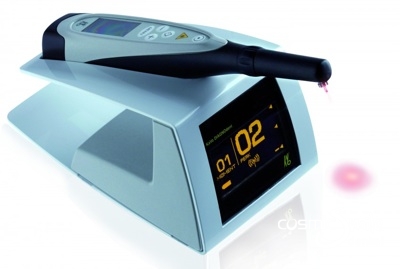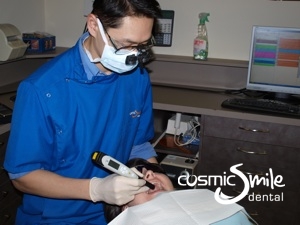Laser Decay Detector – Available at Cosmic Smile Dental
Early detection and prompt treatment of tooth decay is essential for long-term oral health. This knowledge and intervention can help minimise the need for extensive restorative or costly treatment.
Using our Laser Decay Detector, known as the DIAGNOdent, we can measure the density of your tooth structure, ensuring decay in the grooves of your teeth can be detected with 90% accuracy.
This technology incorporates a pen-like device that emits a completely safe laser beam to individually test each tooth. More often, early decay can be treated without the need for anaesthetic and comfortably restored at the same appointment.
More oral bacteria, higher risk of heart attack
Researchers are getting closer to defining the relationship between the organisms that cause periodontal disease and the development of heart disease. Several studies have suggested there is a connection between the two; however, few have tested the theory.
A study conducted by researchers at the State University of New York at Buffalo has now shown that two oral pathogens in the mouth were associated with an increased risk of having a heart attack, but that the total number of germs—regardless of type—was more important to heart health.
“The message here is that even though some specific periodontal pathogens have been found to be associated with an increased risk of coronary heart disease, the total bacterial pathogenic burden is more important than the type of bacteria,” said Dr. Oelisoa M. Andriankaja, who conducted the study in the UB School of Dental Medicine’s Department of Oral Biology as a postdoctoral researcher.
“In other words, the total number of ‘bugs’ is more important than one single organism,” said Dr. Andriankaja. Their analysis showed that the patients harboured more of each type of bacteria than the controls. However, only two species, known as Tannerella Forsynthesis and Preventella Intermedia, had a statistically significant association with an increased risk of heart attack. An increase in the number of different periodontal bacteria also increased the odds of having a heart attack, results showed.
Dr. Andriankaja emphasized that prospective studies that measure oral bacteria in participants who have had no heart problems when they enter the study, and again when a heart attack occurs in a participant, are needed to better assess this potential association.
Sports Drink Consumption Can Cause Tooth Erosion
While sipping on sports drinks all day may provide an energy boost, this popular practice is also exposing people to levels of acid that can cause tooth erosion and hypersensitivity.
In a recent study, it was found that prolonged consumption of sports drinks caused erosive tooth wear, in which acids eat away the tooth’s smooth hard enamel coating and trickle into the bonelike material underneath, causing the tooth to soften and weaken. The condition affects about 5% of Australians causing severe tooth damage and even tooth loss if left untreated.
It is the citric acid in sports drinks that causes the wear. And brushing teeth immediately after consuming a sports drink can compound the problem of tooth erosion, because softened enamel is very susceptible to the abrasive properties of toothpaste and stiff toothbrush bristles.
To prevent tooth erosion, consume sports drinks in moderation, rinse with water and wait at least 30 minutes before brushing your teeth, to allow softened enamel to re-harden. Toothpastes such as Clinpro & Pronamel, and creams like Tooth Mousse / Pro can neutralise acids and help re-harden soft enamel.
Things to know:
- People who drink more than 3 sugary carbonated drinks have 62% more dental decay, fillings and tooth loss
- Enamel begins to demineralise at a threshold pH of 5.5 and exposed root surface at pH 6.5
- A 560g Mountain Dew has 19 teaspoons of sugar and more than 93mg of caffeine
- Recent studies have shown that energy sports drinks can be even more damaging that cola drinks due to the organic acids
- Some bottled water and and flavoured water drinks are also highly acidic
- Do NOT brush your teeth with mineral water when travelling in countries without potable drinking water!!
| Product | Acid pH (low=bad) | Sugar (per 340g) |
| Pure water | 7.00 Neutral | 0 |
| Diet Coke | 3.39 | 0 |
| Mountain Dew | 3.22 | 11 tsp |
| Gatorade | 2.95 | 3.3 tsp |
| Coke | 2.63 | 9.3 tsp |
| Pepsi | 2.49 | 9.8 tsp |
Pregnancy Gingivitis
The surge in female hormones during pregnancy is associated with an increase in gum disease.
Many pregnant women find that their gums bleed easily during brushing because gums are more sensitive to plaque. The effect of this pregnancy gingivitis is first seen when the woman is about 12 weeks into her pregnancy and it may continue through the second and third trimesters.
If pregnancy gingivitis occurs, a visit to us is recommended. It is best to see us prior to pregnancy so that periodontal health is achieved before pregnancy. As well as careful attention to dental hygiene, it is important to visit the dentist more frequently during pregnancy so that plaque and calculus can be removed by professional cleaning. This will help prevent gingivitis.
About Mouthguards
With more adults and children playing sports, injuries to the mouth and face have become more common. Mouthguards are flexible, plastic appliances worn over the teeth to protect them and can help to prevent injuries to the mouth, lips, cheeks and tongue. If you play sport, wear a mouthguard.
By helping to prevent the lower jaw being forced upward into the upper jaw, a mouthguard can sometimes help prevent other serious injuries such as concussions, jaw fractures and neck injuries. Even sports considered low contact such as netball could result in injuries to the face and teeth.
The most effective mouthguards are those made by a dentist from a mold of your teeth.
Considering tooth whitening? Start with a healthy mouth
If you want to whiten your teeth, the best place to start is with a healthy mouth.
Tooth decay, sensitive or cracked teeth, infections or periodontal problems should be diagnosed and treated before any tooth whitening procedure. Otherwise, you could experience discomfort. The whitening process may aggravate existing problems, or the whitening process simply may not be right for you.
Rather than heading to the local cosmetic counter or shopping mall in search of tooth whiteners, start with a dental checkup. We can evaluate, diagnose and treat any oral health conditions and advise you about different options to safely and effectively whiten your teeth.
We can determine whether whitening will work for you. The cause of the discoloration—injury, stains from food or tobacco, antibiotic treatment as a child or other causes— determines the whitening method or product that will be used. The diagnosis is important; otherwise, you could be wasting time and money because whitening treatments work only on natural tooth enamel, not on crowns, veneers, bonding materials or tooth-colored fillings.
Recently, tooth-whitening kiosks have appeared in shopping centres and salons. In other countries, these kiosks have been banned and we expect the same here. Although they may be staffed with people who may look like health care professionals, that often is not the case. Staff running the tooth-whitening kiosk may have no health care training and no license to provide health care services. However, they are dispensing chemicals that could permanently affect and damage your teeth and gums.
White, bright teeth are desirable, but having a healthy smile is more important. Give us a call if you would like to find out more about ZOOM! teeth whitening which will whiten teeth in an hour or tray whitening which is a take home system that will take about a week.
You May Be Eligible for FREE DENTISTRY
The Medicare Enhanced Primary Care program provides up to $4250 of dental treatment rebates for chronically ill people who are being managed by their GP under an Enhanced Primary Care (EPC) plan. We have been supporting the scheme since it was introduced last year. To be eligible, you must have a chronic medical condition with complex care needs and your oral health must be impacting on, or likely to impact on your general health.
If you meet the eligibility criteria, you will need to be referred by a GP to us for assessment and treatment. The primary purpose of the dental treatment must be to improve oral health or function. Medicare rebates will not be paid for dental services that are purely cosmetic in nature. If you are eligible for the scheme, we recommend you start treatment as soon as possible as the program can cease without notice.
The Effects of Medication on Oral Health
A dry mouth is frequently due to medications. Some heart medicines, antidepressants, anti-allergy medicines, fluid tablets, sedatives and medications to help bladder problems can all cause a dry mouth. Attention to oral hygiene is important if you are taking any of these medications.
If you have a persistent dry mouth, pay close attention to oral hygiene as you will be prone to tooth decay. Please phone us if you have any concerns of a dry mouth.



